Six-in-ten Americans say any U.S. voter should have the option to vote early or absentee without having to document a reason, according to a recent Pew Research Center survey.
But there are wide partisan divides on this question:
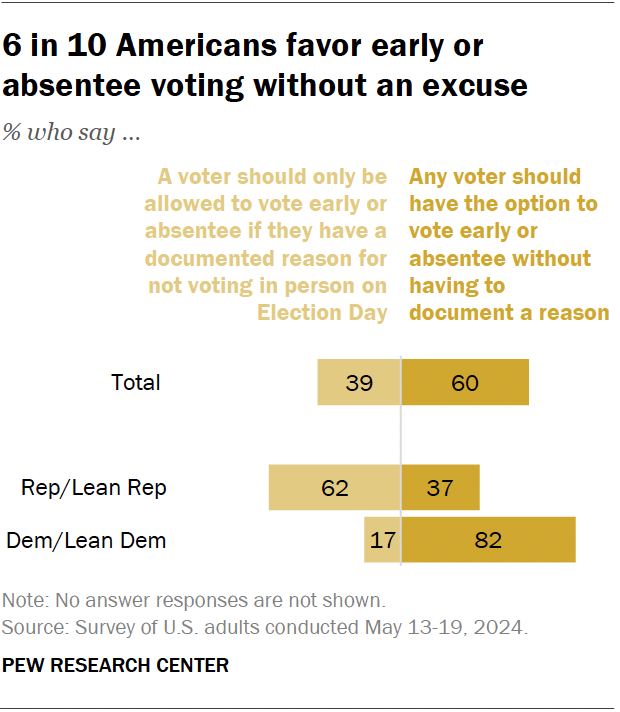
- 82% of Democrats and Democratic-leaning independents say early or absentee voting should be available to any voter without the need for an excuse.
- 62% of Republicans and Republican leaners say these voting methods should only be available to those who have a documented reason for not voting in person on Election Day.
Both early and absentee voting are far more common today than in prior decades. In the 2022 midterm election, fewer than half of voters cast their ballots in person on Election Day. And in 2020 – the first year of the COVID-19 pandemic – only about a quarter did so.
Pew Research Center conducted this analysis to understand how Americans view early and absentee voting ahead of the 2024 presidential election. For this analysis, we surveyed 8,638 U.S. adults from May 13 to 19, 2024.
Everyone who took part in this survey is a member of the Center’s American Trends Panel (ATP), an online survey panel that is recruited through national, random sampling of residential addresses. This way nearly all U.S. adults have a chance of selection. The survey is weighted to be representative of the U.S. adult population by gender, race, ethnicity, partisan affiliation, education and other categories. Read more about the ATP’s methodology.
Here are the questions used for this analysis, along with responses, and its methodology.
How views of no-excuse early and absentee voting have changed in recent years
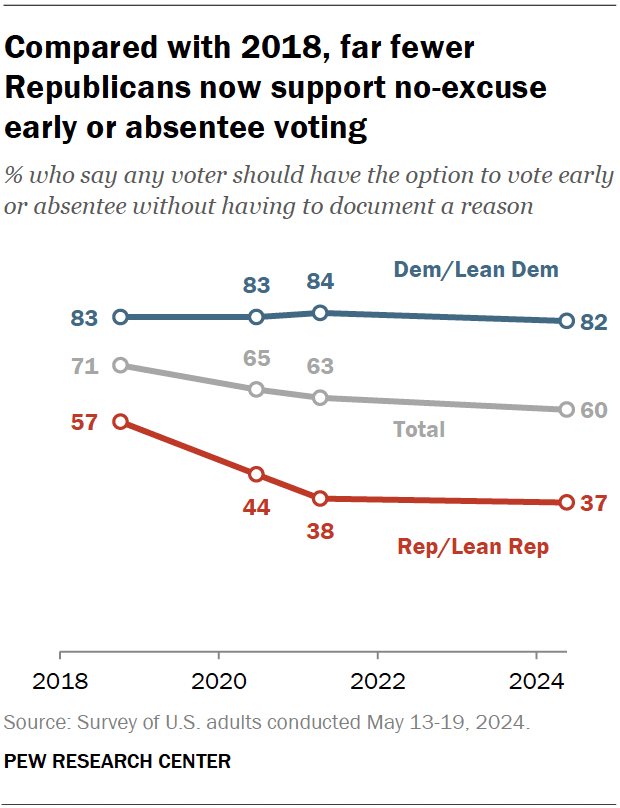
Americans are now less likely to support no-excuse early or absentee voting than they were prior to the 2020 election. This is the result of shifting views among Republicans.
In 2018, when we first asked this question, a 57% majority of Republicans said that any voter should have the option to vote early or by absentee ballot without having to document a reason. They are now 20 percentage points less likely to say this.
In contrast, Democrats’ views on this question are essentially unchanged over the past six years. Since 2018, about eight-in-ten Democrats have said no-excuse early or absentee voting should be available to any voter.
How views of no-excuse early and absentee voting differ by state
Americans who live in states where mail-in ballots will automatically be sent to every voter this November are more likely to have a favorable view of no-excuse early or absentee voting than those who live in states where voters have to request absentee ballots.

- About seven-in-ten adults in states with universal mail-in ballot access (69%) say any voter should have the option to vote early or absentee without having to document a reason.
- This view is shared by a narrower 59% majority of Americans living in states where ballots are not automatically mailed, but where any voter can request a mail-in ballot without an excuse.
- 55% of adults in states that require a valid excuse to vote by mail say no-excuse early or absentee voting should be available to all voters.
Views differ within each party, but differences are more pronounced among Republicans: Nearly half of Republicans living in states where every voter receives a mail-in ballot (47%) favor no-excuse early or absentee voting, compared with 34% of Republicans living in states where a voter must request a mail-in ballot.
Regardless of a state’s policies, Democrats are substantially more likely than Republicans to back no-excuse early and absentee voting.
How views of voting access differ by demographic factors, ideology
There are moderate differences in views of no-excuse early or absentee voting by race and ethnicity, age, and education.
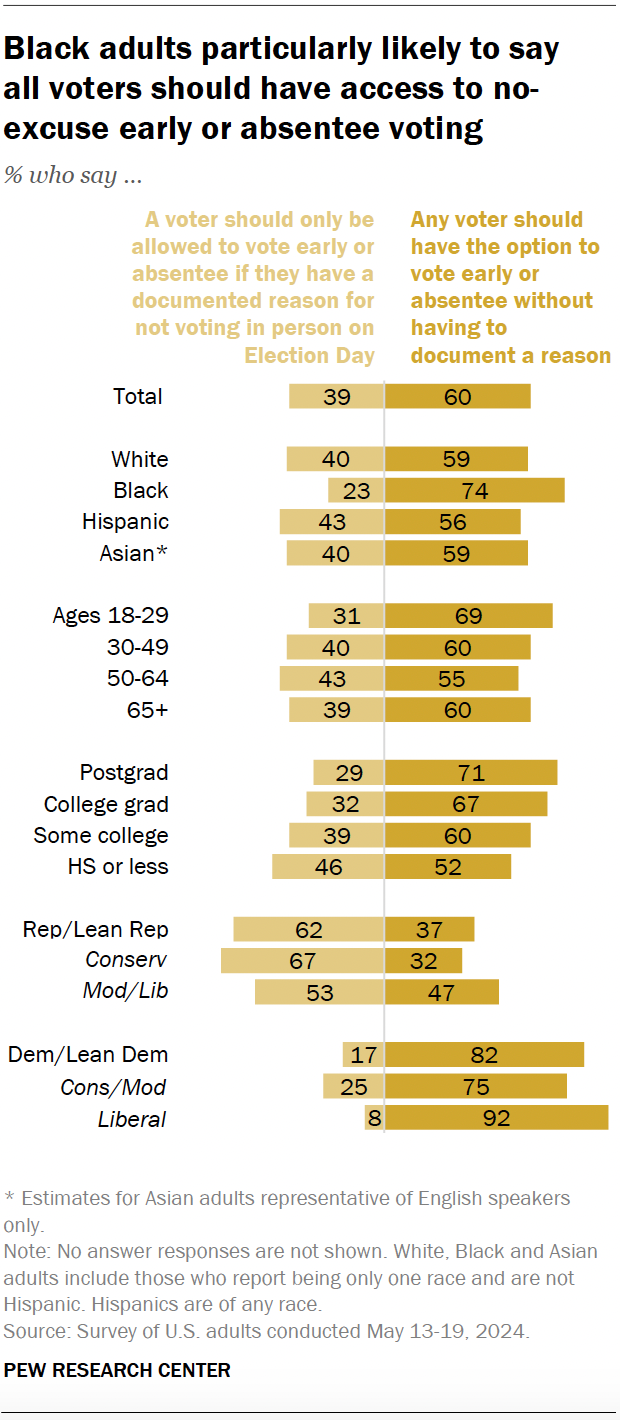
Race and ethnicity
Nearly three-quarters of Black adults (74%) say any voter should have the option to vote early or absentee without an excuse. Smaller majorities of White (59%), Asian (59%) and Hispanic (56%) adults say the same.
Age
Adults younger than 30 are more likely than those in older age groups to support no-excuse early or absentee voting.
Education
Roughly seven-in-ten Americans with a postgraduate degree (71%) favor no-excuse early or absentee voting. This compares with 67% of college graduates, 60% of those who have some college experience but no four-year degree, and 52% of Americans with a high school degree or less education.
Party and ideology
In both parties, views differ by ideology:
- Liberal Democrats are 17 points more likely than conservative or moderate Democrats to back no-excuse early or absentee voting (92% vs. 75%).
- Moderate and liberal Republicans are 15 points more likely than conservative Republicans to support these voting methods (47% vs. 32%).
Would making it easier to vote have an effect on election security?
Demographic and ideological differences also surface on the question of whether elections would be less secure if the rules were changed to make it easier to register and vote.
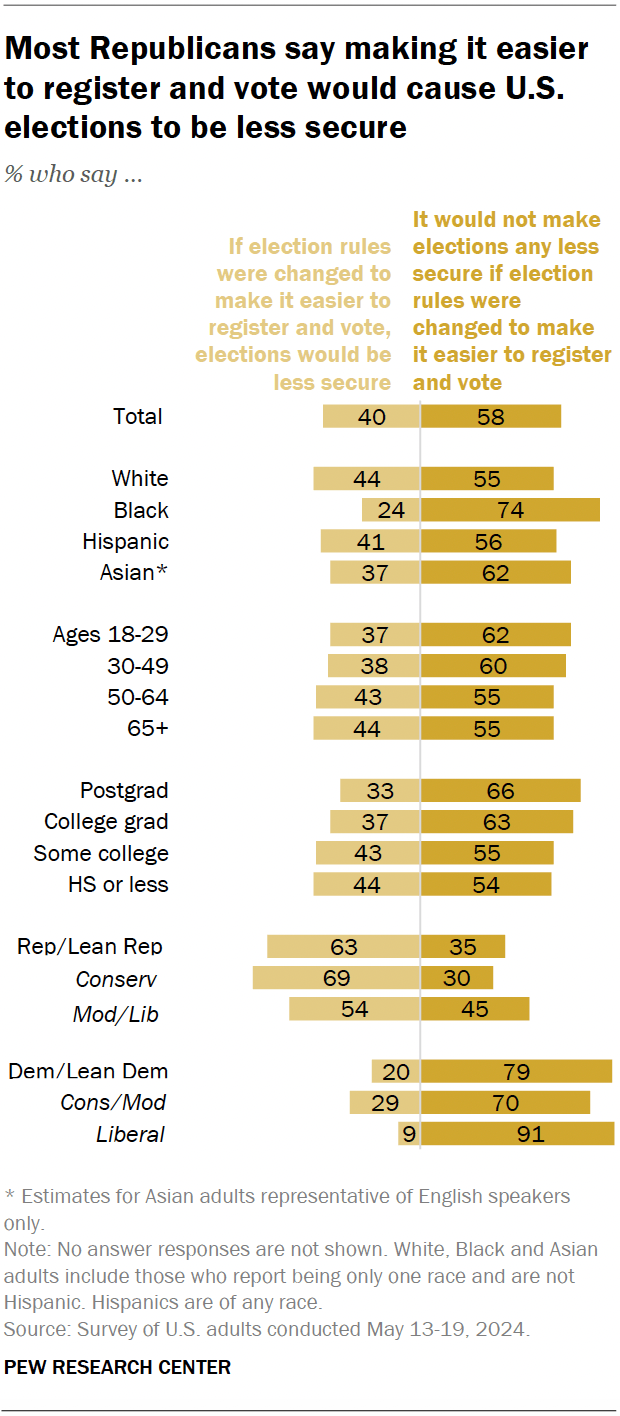
Race and ethnicity
About three-quarters of Black adults (74%) say that changing the rules in this way would not make elections any less secure. About six-in-ten Asian adults say this (62%), as do 56% of Hispanic adults and 55% of White adults.
Age
Adults under 50 are modestly more likely than those ages 50 and older to say that changing election rules would not make elections any less secure (61% vs. 55%).
Education
Americans with at least a four-year college degree are 10 points more likely than those without a degree to say this (64% vs. 54%).
Party and ideology
Around nine-in-ten liberal Democrats (91%) say that changing the rules to make it easier to vote would not make elections less secure. A smaller majority of conservative and moderate Democrats (70%) also say this.
By contrast, nearly seven-in-ten conservative Republicans (69%) say that elections would be less secure if the rules were changed to make it easier to register and vote. A narrower majority of moderate and liberal Republicans (54%) say this.
To categorize states by their voting laws, we relied on data from the National Conference of State Legislatures. We accessed this data on July 3, 2024, and it was last updated on Dec. 20, 2023.
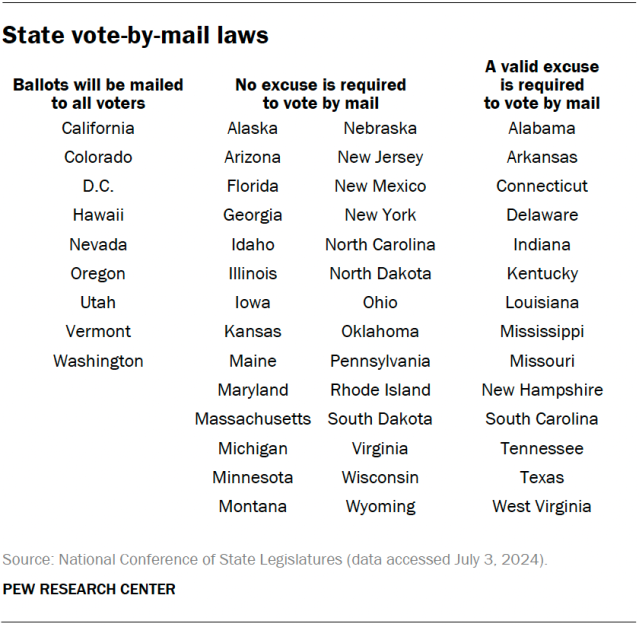
Note: Here are the questions used for this analysis, along with responses, and its methodology.
